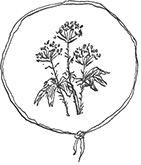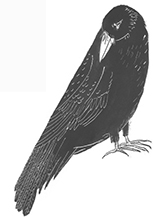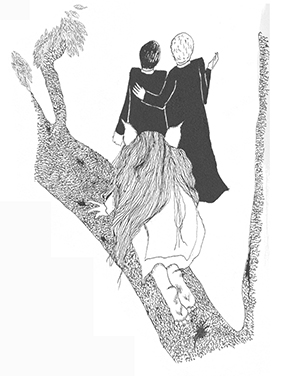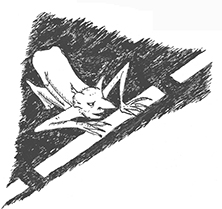
CHAPTER 7
The Making of Promises
“I promised,” Little Fur told the others. They were all sitting under a tree growing just outside the spiked fence around the beaked house.
Crow cawed doubtfully. “Sounding farsome to this burying place.”
“Three nights of going toward the high houses,” Sly added. “That is outside my territory.”
“What if sleeping power not wanting to be waking?” Crow said.
“I must find a way to wake it,” Little Fur said.
“Must?” Ginger murmured.
Little Fur sighed. “What is the use of coming so far for advice if I won’t follow it?”
“That is a sensibleness,” Crow conceded.

“I don’t know if it is sensible or foolish,” Little Fur said wearily. “Will you come with me?”
“Crow coming,” Crow said at once.
Sly rose sinuously, stretching herself out so that the bones in her spine cracked loudly. “I will hunt now,” she said, and mantled herself in cat shadow.
“Soon the sun will open its eye,” Ginger said. “You should find a place to rest for the day.”
“Crow not tired,” Crow complained.
“Then fly back and tell Brownie what has happened,” Little Fur told him. “Hang my seed pouch around your neck and ask the rabbits to fill it again while you are there. But come back before the sun closes its eye again. And be careful.”
“Crow having more carefulness than any other creature,” Crow declared solemnly. He fluffed his feathers in readiness to fly, saying, “I telling Brownie we going on long terribleness of a journey.” He flapped into the air before Little Fur could beg him not to exaggerate so poor Brownie wouldn’t worry himself sick.
Then she thought uneasily that perhaps the dangers they would soon face could not be exaggerated.
She turned to look at the human high houses rising in the distance. At the top of the tallest, a green dome winked ceaselessly on and off. The color seemed a good omen, but the land between it and the beaked house was a jumbled mystery of low human buildings and black roads, and who knew what dangers lurked there. Yet the owl had said that the task was appointed to her, so there must be some hope of fulfilling it.
“Sleep,” Ginger said, padding up beside her on velvet paws. “You stink of tiredness and tangled thoughts.”
Little Fur climbed high enough into the tree that no passing human would catch sight of her and curled against the trunk. She had a leaf-scalloped view of the beaked house, and behind it, the dark blue sky arched down to a pink seam of light opening up at the horizon.
As she slept, Little Fur was drawn so deeply into the tree’s dreaming that she became the tree. A fragrant spring wind rattling softly at her branches teased tender shoots to life, making them unfurl. She sent a root into the damp earth, probing for a subterranean stream, and drank her fill of the pure water springing from the deep stream at the heart of the world.
She felt the sun on her leaves, turning them golden and then brown, and the small sorrow that was their falling. She dreamed of snow flying and of snow melting, and of sunlight again, wan and pale and then bright and hot.
The dream seemed to last years. It was compelling and full of interest, though nothing happened other than the changing of the seasons. Then the sky darkened and a dreadful storm tore up a tree that had once grown on the other side of the spiked fence. The tree crashed against the wall of the beaked house, cracking part of the stonework.
Little Fur woke with a thundering heart. She wondered if the beaked house and the still magic it contained had made her dream the tree’s dream, for that had never happened before. She looked over to the beaked house and was startled to see that the doors were now ajar!
A human came out, its long black tunic snapping in the wind. It came across the cobbles and disappeared under the tree. Curious in spite of her fear, Little Fur crawled carefully to the end of the branch she had been sleeping on and peeped down. She could not see the face of the human, but she could smell the sour reek of its discontent as it gazed back at the beaked house. The smell strengthened when another human came out and turned to close the doors behind it. It wore the same black tunic as the other, but its movements were stiff and slow and its hair white. The old human called out to the younger one, and there was so much kindness in its words that Little Fur was astonished. But when the younger human answered, its voice was full of cold, hard places and cutting edges. It made a sneering gesture at the tree and the moss-covered cobbles; the old human shook its head and made a gesture that embraced the beaked house and the tree and the cobbles. The younger human spoke again, its words soft and accepting, yet such hot waves of rage and greedy impatience burned off it that Little Fur wondered the old human did not recoil. It was clear to her that the younger human would do anything to get what it wanted.

Both humans went out through the gap in the spiked barrier, and Little Fur saw how the younger fretted at having to measure its step to the slow tread of the old human.
When they had gone, she climbed down.
She had slept away most of the day and the air was very warm, full of the drowsy hum of bees and the whirr of cicadas. She drank some water from her bottle, knowing that she must soon find a way to fill it. There was no sign of Sly or Ginger, but maybe the humans had shooed them away while she had been lost in the tree dream. Or they might be hunting for food before the journey. She did not want to think that they had decided to come no farther.
Crow’s absence troubled her more. She thought he would have remembered to come, but he might have forgotten to hurry. To pass the time and stop herself from worrying, she set about gathering edible seeds from small plants growing in the grass about the tree, tucking them into the hem of her tunic.
Very soon the sun had closed its eye and the world fell into shadow. Little Fur decided that she had to go on. She knew that humans retreated into their dwellings when it grew dark, even if they did not sleep at once, and so if she was careful, she ought to be safe. If the others came after she had gone, they would know where to go, for she had told them all of the Sett Owl’s instructions.
Leaving the cobbled yard and the beaked house, Little Fur struck out directly toward the high houses, but almost at once she came to another black road cutting across her path. There was nothing to do but to follow it and hope she would find a way to cross. She thought it would not be too hard, for this road was narrow and cracked along the edges. All she needed was a crack that ran from one side to the other.
The road soon brought her to a long row of human dwellings. There were lights in many of the windows, but Little Fur had no fear that she would be seen if a human glanced out, for the moon had not risen and there were bushes growing along the grass path where she could hide. Even so, she stopped often to sniff at the wind because she was alone now and must keep a watch for greeps and road beasts, as well as for bad trolls.
Little Fur walked for at least an hour seeing nothing more frightening than a rabbit, which ran away before she could speak to it. Then she came upon two lines of metal which cut across the grass path and ran over the black road to vanish into a lane on the other side. Wooden fences rose up on either side of the lane, hiding it from the human dwellings. Little Fur felt a surge of excitement, for it ran directly toward the high houses!
She knelt to look at the metal rails more closely and saw that grass grew along a gap in the black road. She stood and looked both ways along the black road. Not a single road beast had passed and she decided to take a chance.
Little Fur had gotten more than halfway across the road when her foot brushed one of the rails. It stung savagely. When she leaned close, her nose told her that something poisonous had been spilled along it. But the smell was old and the poison too weak to do more than cause her discomfort, so she forced herself to go on. When she got to the other side, she felt a burst of pride at having managed her first obstacle alone.
She followed the metal rails into the lane and sniffed. There was the merest trace of faded human scent, and trolls would not go there because of the earth magic flowing through the grass paths beside the rails. But Little Fur stayed alert, for this was just the sort of place where greeps might lurk.
She saw none, but she was relieved to reach the end of the lane, for it took a long time and more than once she had heard human voices on the other side of the fences. The metal rails ran out of the lane and over a grassy field. She could see human dwellings around the edges of the field but they were far off, so she continued to follow the rails.

Little Fur had walked for some time and was wondering what purpose the metal rails served when a gust of wind brought her the unmistakable perfume of ripe cherries. Her mouth watered, for she loved cherries almost as much as mushrooms.
There was not a single tree in sight but there was a stone wall a little distance off, and she guessed the cherry tree must be on the other side of it. She abandoned the rails and went to the wall. Clearly humans had built it, but it was a long time since they had bothered with it, for there was no human smell about it at all.
The scent of cherries was stronger than ever and Little Fur was suddenly determined to get to them.
